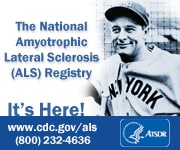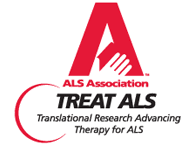 Every day a healthcare provider will put a cardiac patient on a treadmill and push the patient toward some limits just to reveal whatever weaknesses may be lurking in the cardiovascular system.
Every day a healthcare provider will put a cardiac patient on a treadmill and push the patient toward some limits just to reveal whatever weaknesses may be lurking in the cardiovascular system.Turnabout is fair play.
Let's put U.S. healthcare delivery on a treadmill. We'll program the treadmill to move at a really fast speed. We'll put a steep uphill climb. The treadmill now represents a stress test for U.S. healthcare delivery.
Patients with ALS and their caregivers present this stress test to U.S. healthcare delivery every day, and the weaknesses are clear and frustrating and wasteful. Our legislators should be talking to PALS and CALS (even though they don't jump up and down and rant and rave at meetings). They have insights into the system that have nothing to do with the controversies of funding. They know where there are wasteful processes that damage their health and the health of their caregivers. These wasteful processes also waste a lot of money regardless of who is paying the bills.
ALS moves at a rapid clip with physical changes happening much faster than healthcare is delivered. Many caregivers feel like they're always throwing the ball five yards behind the receiver... just because healthcare delivery does not always deliver promptly or accurately.
Ask a person with ALS about the medical equipment errors and outrageous prices and lack of focused selection. If the dealer has a Model X in inventory, will the patient get a Model X rather than the more appropriate Model Y? Can the Model Y arrive before the patient is ready for Model Z? Medicare buys a lot of inappropriate equipment.
Ask a person with ALS about trying to get an appointment with a specialist such as a pulmonologist. Will the scheduling clerks insist on the six-week lead time for a new patient even though the patient's breathing will be significantly compromised in six weeks? Will the scheduling clerk even ask the caregiver what might be convenient?
Ask a person with ALS about how the hospital that inserts a feeding tube doesn't take fifteen minutes to show a family how to use it as a part of the procedure but rather has a home-healthcare agency set up a training appointment in four days. So much for good nutrition for four more days.
Ask a person with ALS about how frustrating it is to fill out clipboards with redundant forms for each new specialist. Medical science has proven better outcomes for people with ALS with a multidisciplinary team approach; however, there is no such thing as teamwork in medical records or paperwork in our system.
If we want to reduce expensive waste and improve quality in the U.S. healthcare delivery system, we should be paying attention to the insights that come from the ALS stress test. We have a healthcare delivery system that likes to move at its own pace and do things they way it does things. When ALS tries to speed up the pace and gives the system a steep climb, our existing healthcare delivery system can't handle the treadmill. Ask someone with ALS or a caregiver.











